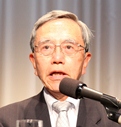The Great Earthquake and Ethos of Scientists and Engineers --- Lessons Learned from the Fukushima Nuclear Accident ---
October 12, 2011
Mr. Hiroyuki Abe
Counselor to the President, Japan Science and Technology Agency
Professor Emeritus, Former President, Tohoku University°°
 °°Science and technology gave birth to nuclear power plants. My speech today will be on responsibility and ethos of scientist and engineers. In the famous Japanese dictionary Koujien, °»ethos°… is defined as an °»ethical practice or disposition prevalent among a specific ethnic or social group.°… I also apply the term for °»organizational ethos.°…
°°Science and technology gave birth to nuclear power plants. My speech today will be on responsibility and ethos of scientist and engineers. In the famous Japanese dictionary Koujien, °»ethos°… is defined as an °»ethical practice or disposition prevalent among a specific ethnic or social group.°… I also apply the term for °»organizational ethos.°…
1.Fukushima Daiichi Nuclear Power Plants: Why did countermeasures against massive tsunami fail?
Engineers both at home and around the world had already pointed out the risk of massive tsunami damaging power sources. Japan must conduct thorough investigation into what caused the accident and disseminate its findings to the world. I do hope the report will refer to °»ethos°… of scientists and engineers, who ought to have provided precise technical expertise to the top-level political and business leaders.
°°Research and development are inseparable from unexpected failures. When it comes to safety design or assessment, however, meticulous preparations are needed to handle various uncertainties from unexpected values and conditions. Also, emergency countermeasures must be elaborated, including economic considerations.
°°
°°°»100% of safety°… is most dangerous and misleading, as such overconfidence impedes preparations for emergency-response measures. While Japanese scientists and engineers remained skeptical, °»100% of safety°… myth took on a life of its own. The core point is to make tireless efforts towards °»100% of safety.°… It is so regrettable that this serious accident occurred, even when all the engineers related to nuclear power plants did actually realize the importance of safety.
°°Each industry takes its own risk countermeasures to secure safety. Unlike the electricity industry, other industries, including automobile, airline or chemical, undergo severe competition. Risk is computed by multiplying °»accident probability rate°… by °»scale of damage.°… Although the probability of a major earthquake is quite low, it entails an enormous scale of damage. Electricity industry bears such risks. It is noteworthy that Onagawa Nuclear Power Plant in Miyagi Prefecture and Tokai Daini Nuclear Power Plant in Ibaraki Prefecture escaped catastrophic damage from the earthquake, thanks to risk-averse plant design and bulwark installed by civil engineers.
°°°»Economic efficiency°… and °»safety°… often conflict with each other, so the management and technical sides must maintain a healthy equilibrium to guarantee safety. Extensive discussions and reexamination are needed to encourage engineers to raise awareness on safety and respect ethos in the context of individual expertise.
°°Role and function of scientists should also be reexamined. Scientists must provide precise advice to the government. The science councils and academic societies are expected to give clear scientific explanations on conditions that allow continuation of nuclear power plants.
°°Immediate suspension of nuclear power plants is not feasible. Members who are independent from the government or operator must give collective scientific opinion to convince countries around the world, especially the US, China and France.
2.Culture of Wisdom
°°It can be said that the Fukushima accident was triggered by the unique Japanese society, where scientists and engineers have failed to provide reliable advice to the government and electric power companies. This is why we must revisit the °»culture of wisdom°… in essence.
°°Professor Michio Morishima pursued his academic career in London University over many years and observed Japan from outside. In his publication °»Why Japan Stalled?°… he wrote that °»economic competitiveness is closely related to ethos. Success in Japan up to the 80s was brought by the generation who were educated before the end of World War≠∂and the following generation who were taught by them. As Japan was defeated in the war, it underwent a major change in thinking. Japan plunged into the stage of turmoil by 1990, when the postwar generation who do not share the traditional ethos became dominant. Japan will become a country of no importance by 2050.°…
°°I believe the three elements of °»creation, ethos and intelligence°… underlie the culture of wisdom.
3.How to Establish a Safe Society and State? --- Building a broader security ---
°°°»Security°… refers to either Self-Defense Forces or police in Japan. It must take a broader interpretation and encompass also nuclear power plants. While in US, scientific technology and higher education are also regarded to form the bases of national security.
°°Japan faces a major crisis of natural disaster and economic collapse today. The key to overcome such challenges is to examine °»the way democracy should be°… in this modern era where scientific technology dominates the world. We cannot and should not stop the advancement of science. We must give careful consideration on which elements to adopt and which elements to be controlled, based on the establishment of the °»spiritual culture of wisdom°… and °»ethos of wisdom°… tailored for the 21st century.
°°The Great Lisbon Earthquake and tsunami in 1755 claimed tens of thousands of lives. Yet it served as a major turning point in European civilization and gave birth to seismology.
°°We must overcome disastrous damages from the earthquake by taking immediate steps to draw crisis management strategies and make due preparations. Scientists are urged to provide scientific data on which safety countermeasures will be drawn. Japan must provide due explanations to the rest of the world that will convince them.